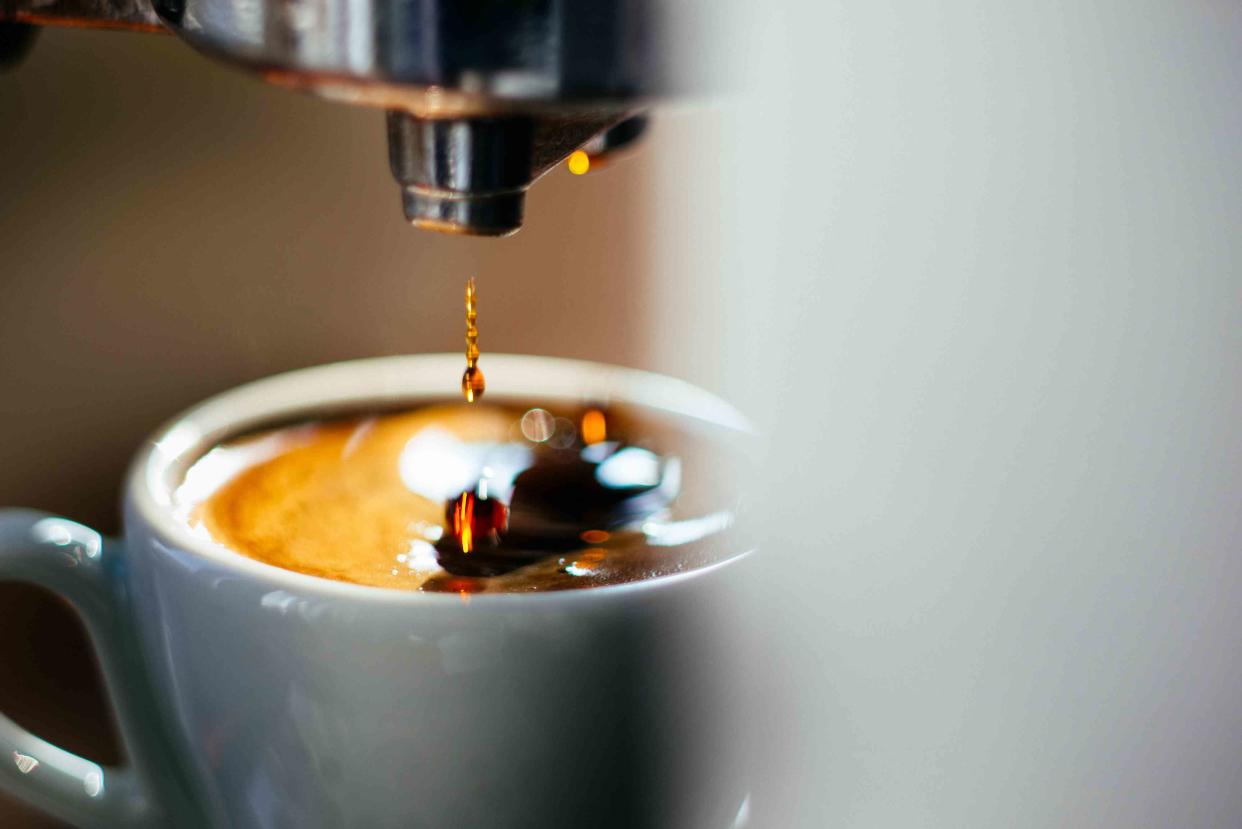Drinking Coffee Might Reduce Risk of Colorectal Cancer Recurrence, Study Finds

Guido Mieth / Getty Images
Fact checked by Nick Blackmer
Key Takeaways
New observational study linked coffee with lower risk of colorectal cancer recurrence.
Coffee might reduce oxidative stress and protect cells from damage.
More research is needed to confirm the findings so experts recommend adjusting other lifestyle factors and getting colorectal cancer screenings.
If you drink multiple cups of coffee a day, there’s new research to support your habit.
Drinking three to five cups of coffee each day may reduce the risk of colorectal cancer recurrence and death, according to an observational study in the Netherlands.
This observational study relied on data from 1,719 people in the Netherlands with stage 1–3 colorectal cancer. Those who drank more than four cups of coffee each day had a 32% lower risk of recurrence compared to people who drank less than two cups per day.
“It is unclear whether this is generalizable to other populations in other parts of the world,” David A. Greenwald, MD, director of Clinical Gastroenterology and Endoscopy at Mount Sinai Hospital, who was not involved in the study, told Verywell in an email. “There are certainly other factors that affect risk for recurrence of colorectal cancer like the precise stage of the tumor.”
Around 20%–30% of people with stage 1–3 colorectal cancer experience recurrence.
“Patients with stage 2 to 3 colorectal cancer, however, could consider the findings in the study as they choose diet and lifestyle plans,” Greenwald added.
Related: Colon Cancer Recurrence Statistics
Can Coffee Reduce Colorectal Cancer Risk?
A randomized controlled trial in 2015 also found that drinking at least four cups of coffee a day significantly reduced the risk of recurrence and death for people with stage 3 colon cancer.
A 2016 study concluded that drinking over 2.5 servings of coffee each day reduced colorectal cancer risk by 54%, while another 2020 research associated coffee consumption with increased survival in people with advanced or metastatic colorectal cancer.
However, studies on coffee and colorectal cancer are inconsistent. A 2018 meta-analysis from Japan did not find enough evidence to show that coffee impacts colorectal cancer risk.
“The most important thing that people can do to reduce the risk of colorectal cancer recurrence is to form a relationship with an oncologist and follow their recommendations. Regular monitoring of blood levels, including carcinoembryonic antigen (CEA), and for many, regular imaging studies to detect any recurrence early is indicated,” Greenwald said.
Related: Why Gut Health Matters for Colorectal Cancer Risk, Especially for Young People
Although there isn’t conclusive evidence, certain properties in coffee—such as caffeine, flavonoids, and polyphenols—could keep cancer from spreading or protect cells from damage.
“Drinking coffee may help reduce oxidative stress—the condition where there are too many unstable molecules in the body, resulting in tissue damage,” said Misagh Karimi, MD, a medical oncologist at the City of Hope Orange County Lennar Foundation Cancer Center in Irvine, California. “Another possibility is that coffee may affect microorganisms in a way that promotes the effects of chemotherapy on the cancerous cells, preventing a recurrence. And drinking coffee may improve the liver function in people with colorectal cancer.”
Karimi said these possibilities presented in the new study still need to be confirmed by additional research.
It’s unclear exactly how much coffee the study participants drank since the researchers used self-reported data. Standard coffee cups are generally smaller in Europe than in the United States, so it is likely that the optimal reported range of three to five cups per day would translate to fewer cups of coffee in other parts of the world.
The researchers also didn’t specify if participants drank caffeinated or decaf coffee, although they noted that most people in the Netherlands drink caffeinated coffee.
Related: Study: Drinking Coffee Might Help Colorectal Cancer Patients Live Longer
What Can You Do to Reduce Colorectal Cancer Risk?
Age, genetics, family history, and having inflammatory bowel disease can all increase your risk of colorectal cancer—one of the fastest-growing early-onset cancers in the United States.
There’s not enough evidence for experts to recommend drinking coffee to reduce your risk of developing colorectal cancer or preventing recurrence after a diagnosis.
But exercising regularly, maintaining a healthy body weight, avoiding alcohol, quitting smoking, and eating a diet high in fruits, vegetables, and whole grains and low in red meat and processed foods may help reduce colorectal cancer risk.
You should also get a screening starting at the age of 45, although you could get screened earlier if you have a family history of colorectal cancer.
“The most important things people can do to reduce their risk of colorectal cancer is to maintain healthy lifestyle choices and to get colon cancer screening as their physician recommends and in keeping with their risk profile,” Karimi said.
Related: 4 Early Symptoms of Colon Cancer Young Adults Should Know
What This Means For You
There is not enough evidence to prove that drinking coffee reduces colorectal cancer risk or recurrence. You can consult with your healthcare provider about your risk. Most people should start getting screened at age 45.
Read the original article on Verywell Health.

